Future Bride Sets No-Pet Policy For Her Wedding Because Of Her Allergies, Nephew Says He Won’t Attend Without His Service Dog
We're back again today with yet another fantastic Reddit post to look at, and this one is straight from the AITA thread that you all know we love covering posts from. We often go over these posts because they're super entertaining and overall have a great vibe; plus, the comments always provide good advice.
People often come to these threads to get unbiased advice and opinions on what's going on in their lives. So, with that being said, we're here looking into a post that was submitted by a woman who's trying to determine if she's in the wrong for a decision she made about her wedding.
Essentially, she's making it pet-free, which wouldn't otherwise be a problem if her nephew didn't have a service dog, which she's still not allowing him to bring. So, she's looking to see if she's actually in the wrong for this and should make an exception, or if she's doing what she should.
The main reason is that she's allergic to dogs, which might be reason enough for some of you, so we'll just have to see. But ultimately, we're going to dive into the full post, plus all the comments, to see what the full story and verdict are.
OP starts off her post by telling us she's getting married, and then she goes into some details on what their agreement was and what the problem is.
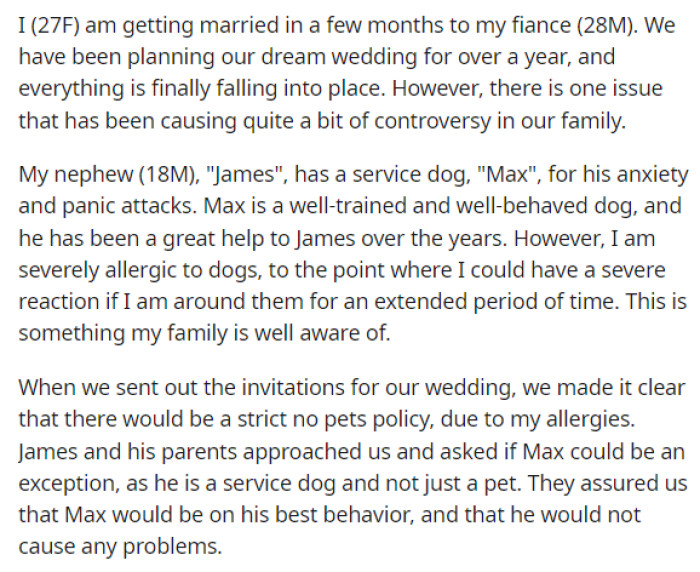
She is standing her ground but essentially wants to know if she's wrong and should make some sort of exception for her nephew and his service dog.
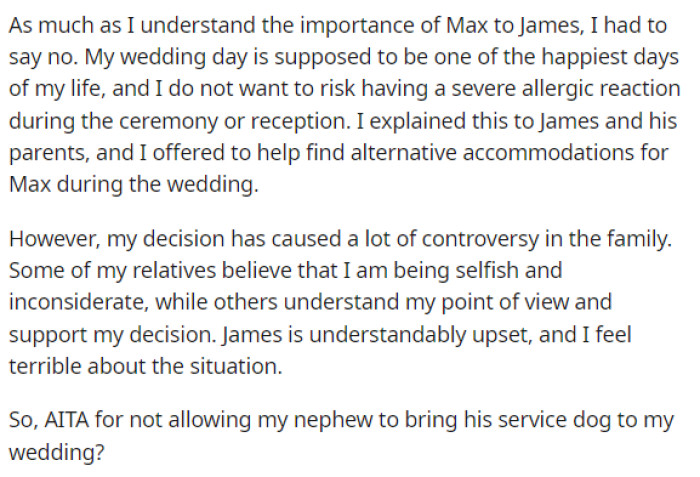
People came to the comments with lots to say, and ultimately, they started by saying that OP is NTA and that the nephew might just be SOL.

The Intersection of Personal Health and Social Obligations
The conflict surrounding the no-pet policy for the wedding highlights the often-overlooked intersection between personal health issues and social expectations. Dr. Helen Foster, a psychologist specializing in health psychology, points out that individuals with allergies often face unique social dilemmas that require careful navigation.
Her research indicates that social gatherings can pose significant challenges for those with allergies, leading to feelings of isolation or pressure to conform to social norms, which can exacerbate their health issues.
The decision to establish a no-pet policy for a wedding underscores the complexities of managing personal health concerns and family dynamics.
Research in family psychology highlights how such decisions can lead to conflicts due to differing values and priorities among family members.
In this case, the bride's allergies represent a legitimate health concern that requires consideration, yet it also raises questions about the inclusivity of family members.
The Intersection of Personal Needs and Family Events
This scenario highlights the tension between personal needs and familial obligations, particularly during significant events like weddings.
Dr. Alan Wolfelt, a grief counselor, notes that personal health considerations, such as allergies, must be acknowledged and respected in these contexts.
When personal needs are dismissed, it can lead to resentment and a feeling of being undervalued within the family unit.
Then people came to explain what an allergic reaction could consist of and why this might be a big problem if he brings the dog to the wedding.
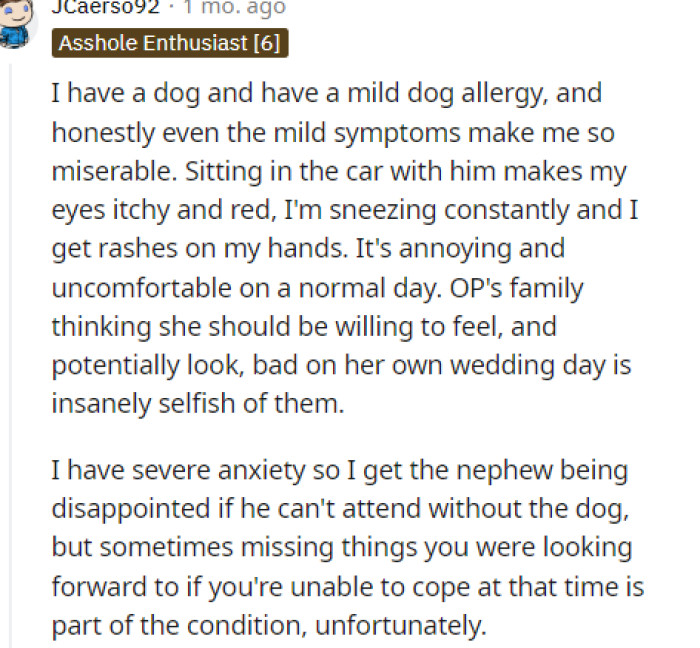
This is something to consider too because allergies can be very rough. It might not seem like a big deal to others, but for the bride, this is her day.
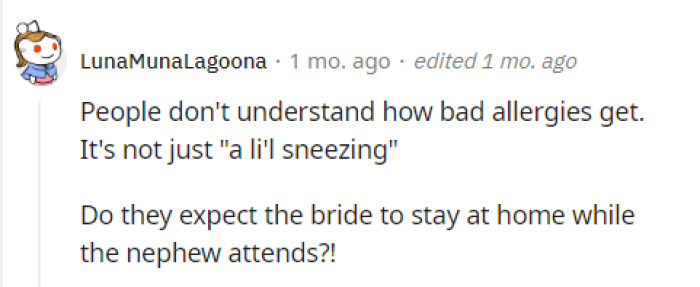
This is true too, but honestly, she may have said that simply because of her allergies, and making that decision was the safest option.
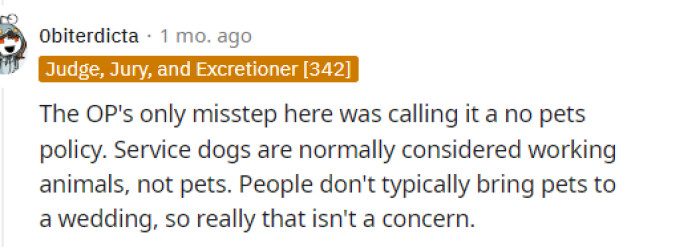
Studies published in the Journal of Health Psychology show that individuals with specific health concerns often experience heightened stress during social interactions. This can lead to a dilemma between adhering to one's health needs and maintaining social relationships, which is an essential aspect of well-being.
Balancing Personal Health with Family Expectations
When personal health issues intersect with family events, it can create tension and difficult choices.
Studies show that individuals often feel guilty or conflicted when prioritizing their health over family expectations, which can lead to emotional distress.
In this scenario, the bride's decision reflects a necessary boundary that aims to protect her well-being, which is crucial for her ability to enjoy her wedding day.
Research indicates that family events can often lead to stress when personal boundaries are not respected. According to Dr. Michele Gelfand, a cultural psychologist, "Clear communication about personal needs is essential to prevent misunderstandings and foster a harmonious atmosphere." This underscores the importance of balancing personal health with family dynamics to ensure everyone's comfort and well-being.
Some people ultimately told her that she can do whatever she wants because it's her wedding, and nobody can tell her any different. If they don't like it, then they can choose not to attend.
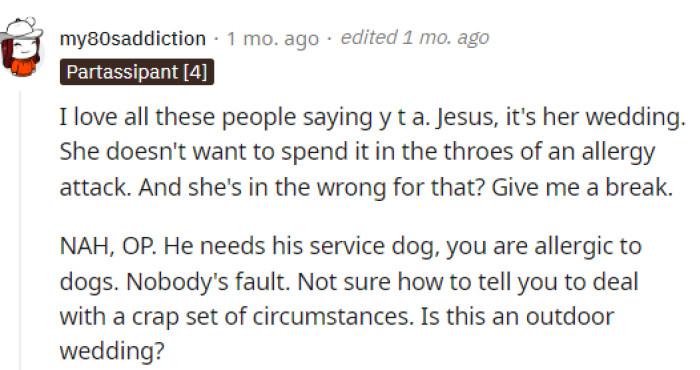
The allergies are what led people to their verdict mostly. If it had been any other circumstance, then she might actually be TA, but in this case, she's not.
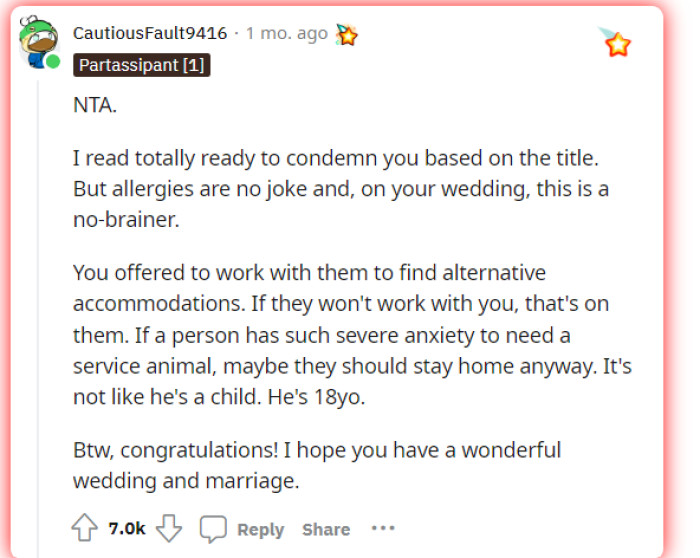
Basically, everyone is agreeing that she's NTA and she has free will to make whatever rules she wants for her wedding, including this one.

Navigating Compromise in Social Settings
In situations where health issues intersect with family obligations, such as weddings, finding a balance is crucial. Dr. Karen Mitchell, a family therapist, suggests that open communication about health-related needs can lead to more understanding and cooperation among family members.
She emphasizes the importance of discussing potential accommodations—like designated pet-free areas—that respect both the bride’s allergies and the nephew’s need for his service dog.
However, the nephew's insistence on bringing his service dog highlights the importance of understanding and accommodating diverse needs within family dynamics.
Research in social psychology suggests that empathy and communication are vital when navigating conflicting interests, as they can foster a more inclusive atmosphere.
In this case, the bride and her family might benefit from open discussions about the needs and perspectives of all family members involved.
Navigating Family Expectations and Personal Health
Family expectations can create pressure, particularly when they conflict with individual health needs.
Dr. Brené Brown emphasizes the importance of advocating for oneself in family dynamics, encouraging open communication about personal limitations.
By articulating needs clearly, family members can foster understanding and support rather than conflict.
It does suck for others, but hopefully, they will be understanding and recognize where the bride is coming from.

This is a truly difficult situation. People really think that OP is NTA for this, and we have to agree.
If it hadn't been for her allergies, then things might be different, but allergies are no joke, and on her wedding day, that would be a no from us.
Do you agree with the verdict, or do you think she should make accommodations?
To address the nephew's concerns, the bride can engage him in a discussion about the importance of her health needs while also expressing her desire for his presence.
Compromises, such as designating pet-free areas or providing alternative arrangements, can be explored to accommodate both parties.
This approach not only respects individual needs but also promotes family cohesion during significant events.
Psychological Analysis
This situation underscores the challenges of balancing personal health needs with family expectations.
It's important for individuals to advocate for themselves while also seeking compromises to maintain family harmony.
Analysis generated by AI
Analysis & Alternative Approaches
Navigating personal needs within family dynamics is essential, especially during significant events.
As noted by Dr. William Doherty, family therapist, "Open communication and compromise are vital for maintaining healthy relationships, particularly when personal needs come into play." This sentiment is echoed by Dr. Eli Finkel, relationship researcher, who emphasizes that "understanding each other's perspectives can help families navigate conflicts effectively." Together, these insights highlight the importance of fostering understanding to preserve familial bonds.
Understanding Service Animals and Their Importance
Service animals play a crucial role in supporting individuals with disabilities, and their presence can significantly impact the well-being of their handlers.
According to the Americans with Disabilities Act, service animals are not just pets but essential companions that provide necessary support for individuals with disabilities.
Research indicates that accommodating service animals can enhance the quality of life for those who rely on them, making it vital to consider their needs in family events.
Moreover, finding a compromise that respects both the bride's health and the nephew's need for his service dog could promote familial harmony.
Family conflict resolution strategies suggest exploring alternative solutions, such as designating specific areas for pets or discussing the possibility of outdoor ceremonies where the dog could be accommodated.
Open dialogue can lead to creative solutions that respect everyone's needs.
Fostering Empathy in Family Dynamics
Empathy plays a crucial role in navigating family conflicts, particularly when health issues and personal needs intersect.
Research shows that engaging in empathetic conversations can help family members understand each other's perspectives and find common ground.
Encouraging family members to share their feelings and needs openly can create a more supportive environment where everyone's concerns are acknowledged.
Ultimately, this situation illustrates the need for balance in family dynamics, especially when personal health and family traditions collide.
By approaching the situation with understanding and open communication, family members can work towards a resolution that honors both the bride's health and the nephew's needs.
Such compromises can foster a sense of unity and support within the family.
Psychological Analysis
This scenario highlights the tension that can arise when personal health concerns intersect with family events.
From a psychological perspective, it’s essential to recognize the importance of accommodating diverse needs to maintain family harmony and support.
Analysis generated by AI
Analysis & Alternative Approaches
In summary, navigating family dynamics around health concerns requires empathy, open communication, and a willingness to compromise.
Research indicates that fostering understanding can lead to more harmonious relationships and improved problem-solving in family settings.
Moreover, research shows that when individuals are honest about their needs, it can foster a sense of community and support among family members. A study in the American Journal of Psychology found that families who practice open communication about health concerns report stronger relationships and higher levels of overall satisfaction.
Psychological Analysis
This situation highlights the challenges individuals face when balancing personal health with social obligations. Clear communication about needs and expectations is essential for fostering understanding and cooperation among family members.
Analysis generated by AI
Analysis & Alternative Approaches
In conclusion, navigating social obligations while considering personal health needs can be challenging. As Dr. Foster emphasizes, open dialogue and compromise are vital in finding solutions that respect everyone’s needs. By fostering communication and understanding, families can create a more inclusive and supportive environment for all members.



